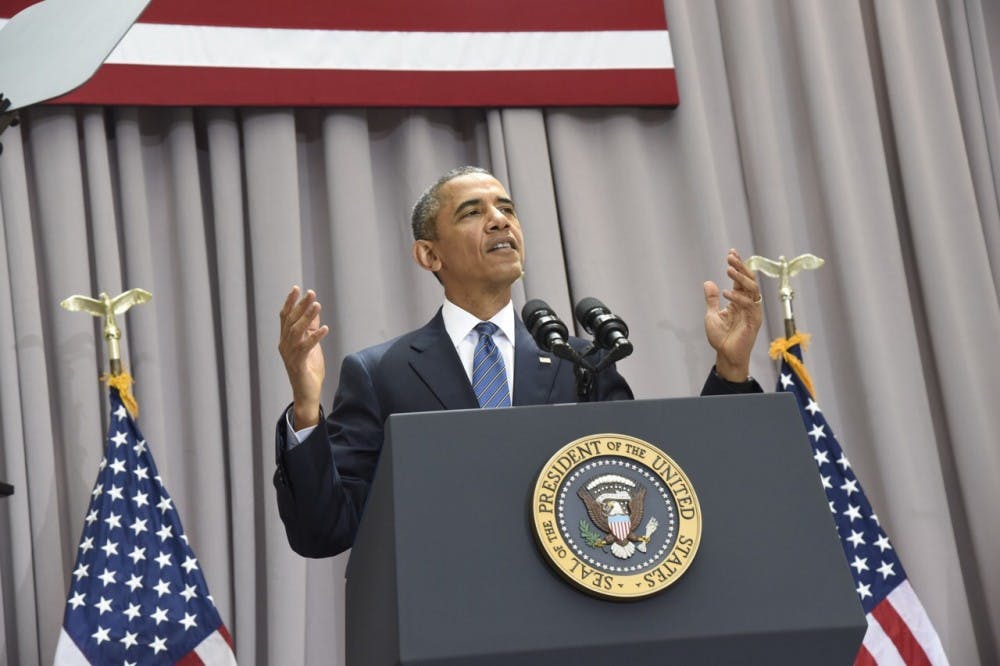President Barack Obama challenged critics of the recent nuclear accord with Iran in a speech at the School of International Service Wednesday, posing a black-and-white scenario: accept the deal or risk further war in the Middle East.
The deal implements limits on the Iranian Nuclear program over the next 15 years by reducing the country’s stockpiles of enriched uranium and closing two thirds of its centrifuges, both of which are necessary to build a nuclear bomb. It has been heavily criticized by Republican opponents and the Israeli government since it was announced, in part because it offers economic sanction relief to Iran in exchange for compliance.
"For Iran to cheat, it would need a secret source for every single aspect of its program," Obama said.
The speech, to which Obama was 38 minutes late and which lasted over an hour, was the third time he has spoken on AU’s campus as president, the most visits of any sitting president. It was well-attended by foreign dignitaries and media, including Chinese Ambassador to the US, Cui TianKai and many members of Israeli press.
AU students and staff from all schools in the University also attended, with each school allocated tickets to engage the AU community, according to James Goldgeier, Dean of the School of International Service. SIS earlier emailed its students about a lottery to attend.
“I’m not usually one for politics, but just being a part of this historic moment was amazing,” said Maddie Weyand-Geise, a sophomore in the College of Arts and Sciences.
Weyand-Geise said that before she was contacted by her advisor to attend the event she knew very little about the deal or the issues surrounding it.
“I’m more of an arts person, but the invitation prompted me to do some research and now I am very interested in the issue,” she said.
Student Government President Sasha Gilthorpe said the event was a boon for the University.
“The fact that President Obama chose American University is a huge testament to the community we are all a part of,” she said. “History takes place here.”
Obama directed his speech at critics of the deal, stressing what he described as a strong US-Israel relationship, the need to maintain peace in the region and ultimately urging Congress to accept the deal in its September vote.
At one point the president compared Republican critics to Iranian hardliners who may be filmed yelling “Death to America!” and who he said similarly oppose the deal. He also called out pundits he said had become “armchair scientists” by contradicting the expertise of Energy Secretary Ernest Moniz, who is also nuclear physicist and was involved in drafting the deal.
He encouraged Israeli detractors to accept the deal.
"Every nation of the world that has commented publicly, with the exception of the Israeli government has expressed support." #ObamaAtAU
— The Eagle (@TheEagleOnline) August 5, 2015
"To the Israeli people I say this: a nuclear armed #iran is far more dangerous to #Israel" @POTUS #ObamaAtAU
— The Eagle (@TheEagleOnline) August 5, 2015
Throughout the speech, Obama rejected the notion that the United States should turn down the current agreement in hopes of a better deal that might have included stronger sanctions.
“Sanctions alone are not going to force Iran to completely dismantle all vestiges of its nuclear infrastructure,” he said. "Those who say we can walk away from this deal and maintain sanctions are selling a fantasy.”
Rejection of the deal would mean the exhaustion of all alternatives to military action, he said. Obama repeatedly pounded the importance of avoiding another war in the Middle East, noting that the only militant organizations have benefited from recent wars in the region.
“The emergence of Al Qaeda in Iraq has evolved into ISIL and ironically, the single greatest beneficiary from the region...was the Islamic Republic of Iran,” he said, using an acronym for the group more commonly known as the Islamic State.
Iran does have a history of supporting militant groups in the region. The president argued that while some funds will continue to go to uses the US government does not approve of, the economic relief the release of sanctions will supply will not impact that funding as much as is being discussed.
In fact, Iran has engaged in such activities before sanctions began.
The current deal prevents Iran from obtaining plutonium, enriched uranium, removes two-thirds of the country’s centrifuges and allows decades of inspector access to the nuclear supply chain.
"Nuclear material isn't something you can hide in the closet. It can leave a trace for years,” he said. “We can catch them and we will," he said.
sgaber@theeagleonline.com
—Jared Angle contributed to this story.





